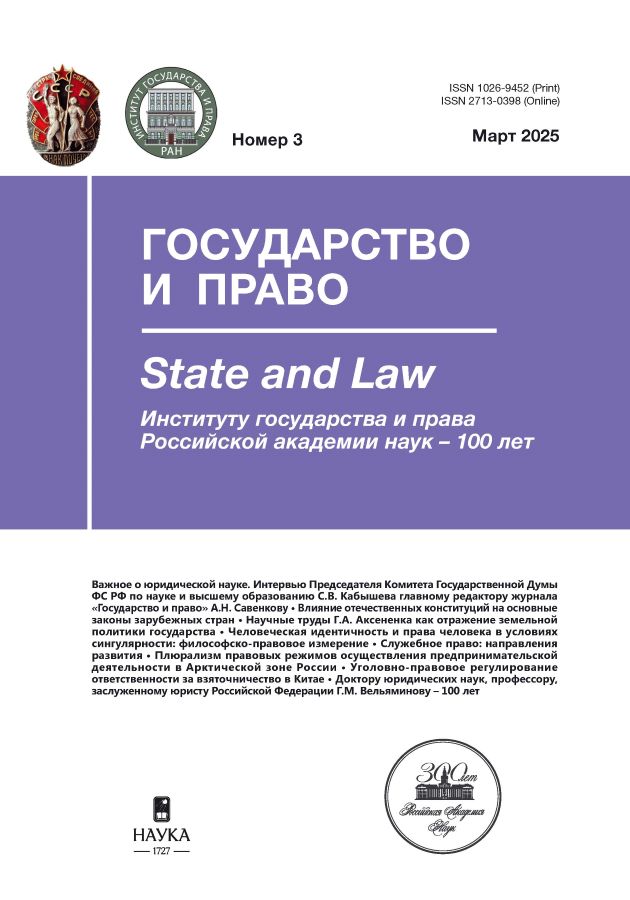Ideological dynamics of the development of the theory of state in the USSR in the 1930s in the political publications of A.F. Kerensky
- Autores: Nikandrov A.V.1
-
Afiliações:
- Lomonosov Moscow State University
- Edição: Nº 3 (2025)
- Páginas: 173–182
- Seção: Pages of history
- URL: https://rjpbr.com/1026-9452/article/view/683028
- DOI: https://doi.org/10.31857/S1026945225030161
- ID: 683028
Citar
Texto integral
Resumo
The article is devoted to a little-studied episode from the life and biography of A. F. Kerensky, connected with his emigrant journalism of the 1920s–1930s, dedicated to his reflections on the USSR. In the late 1920s, in some political articles, he predicted that the Soviet state in the domestic sphere would develop in the direction of national and state unity and overcoming the division into classes, from a “class state” to a democratic state. А. F. Kerensky expresses confidence that a new ideology is being created in the USSR, which will be adopted to replace the old one, based on the principles of proletarian internationalism and the dictatorship of the proletariat. In a number of important publications in 1936, on the problems of Soviet constitutional reform, he reveals the essence of the principle the of State of all the people, which is incompatible with the principle of the dictatorship of the proletariat. In a series of articles of 1936, A. F. Kerensky reveals the essence of the new principle of the State of all the people, which, in his opinion, was laid at the foundation of the new ideology of the Soviet state by I. V. Stalin.
Texto integral
Sobre autores
Aleksey Nikandrov
Lomonosov Moscow State University
Autor responsável pela correspondência
Email: bobbio71@mail.ru
PhD in Politics, Senior Researcher of the Department of Theory of Philosophy of Politics and Law, Faculty of Philosophy
Rússia, 27 Lomonosovsky Ave., bld. 4 (Shuvalovsky academic building), 119192 MoscowBibliografia
- A. F. Kerensky: Pro et contra. Anthology / A. V. Nikolaev (comp.). SPb., 2016. Pp. 536–538 (in Russ.).
- Basmanov M. I., Gerasimenko G. A., Gusev K. V. Alexander Fedorovich Kerensky. Saratov, 1996. P. 184 (in Russ.).
- Editorial. “October” is excluded // Days. 1927. No. 1239. November 16. P. 1 (in Russ.).
- Kerensky A. F. From afar. Collection of articles (1920–1921). Paris, 1922. Pр. 47, 67 (in Russ.).
- Kerensky A. F. From Lenin to Mussolini // New Russia. 1936. No. 7. P. 1 (in Russ.).
- Kerensky A. F. Idea in the service of the state // Days. 1928. No. 15. December 16. Pp. 2, 3 (in Russ.).
- Kerensky A. F. In place of the class – the nation // New Russia. 1936. No. 17. December 1. P. 3 (in Russ.).
- Kerensky A. F. Introductory remarks // New Russia. 1936. No. 8. July 1. P. 5 (in Russ.).
- Kerensky A. F. New Russia // New Russia. 1936. No. 1. March 8. P. 1 (in Russ.).
- Kerensky A. F. Russia or the Comintern? // New Russia. 1936. No. 2. March 22. P. 1 (in Russ.).
- Kerensky A. F. The fascization of Stalinism // New Russia. 1936. No. 8. July 1. P. 2 (in Russ.).
- Kerensky A. F. The Soviet state and the All-Union Communist Party // New Russia. 1936. No. 6. May 17. P. 2 (in Russ.).
- Kerensky A. F. V. V. Sukhomlin’s bewilderment // Days. 1929. No. 24. February 24. Pp. 2, 4 (in Russ.).
- Kerensky A. F. The state comes first // Days. 1928. No. 14. December 9. Pp. 1, 2 (in Russ.).
- Pashukanis E. Soviet state of all the people // Pravda. 1936. May 9. P. 2 (in Russ.).
- Shirinsky-Shikhmatov A. Yu. Speech in the debate // New Russia. 1936. May 17. P. 14 (in Russ.).
- The labor people’s socialist party: Documents and materials / A. V. Sypchenko & K. N. Morozov (comp.). M., 2003. Pp. 65, 66 (in Russ.).
Arquivos suplementares










